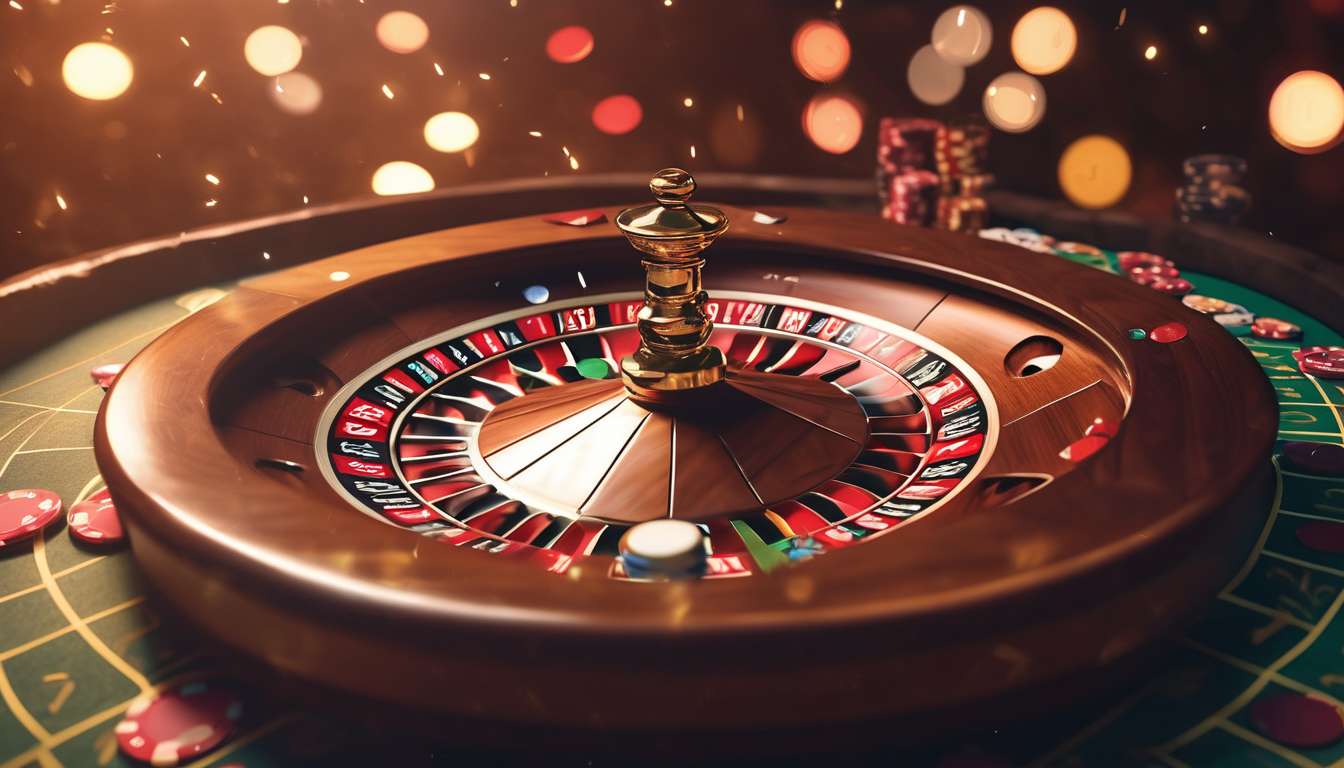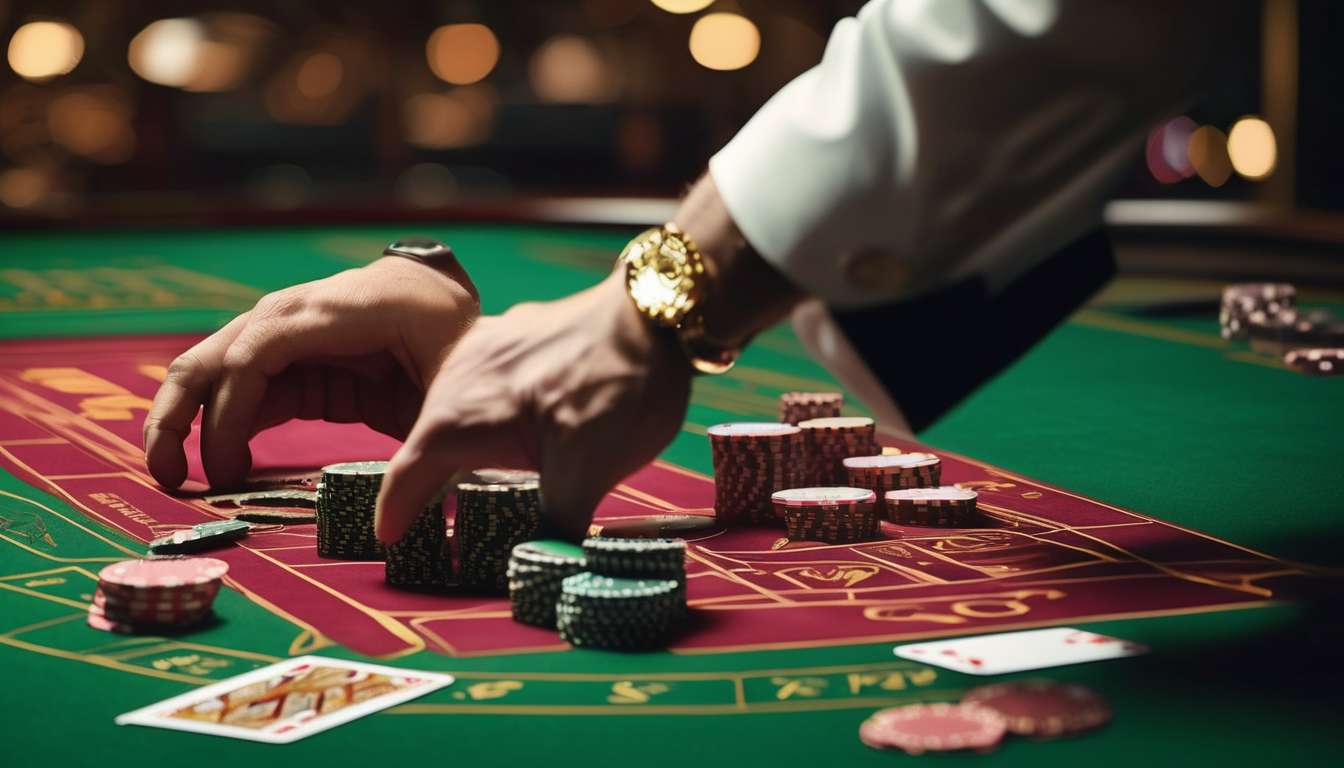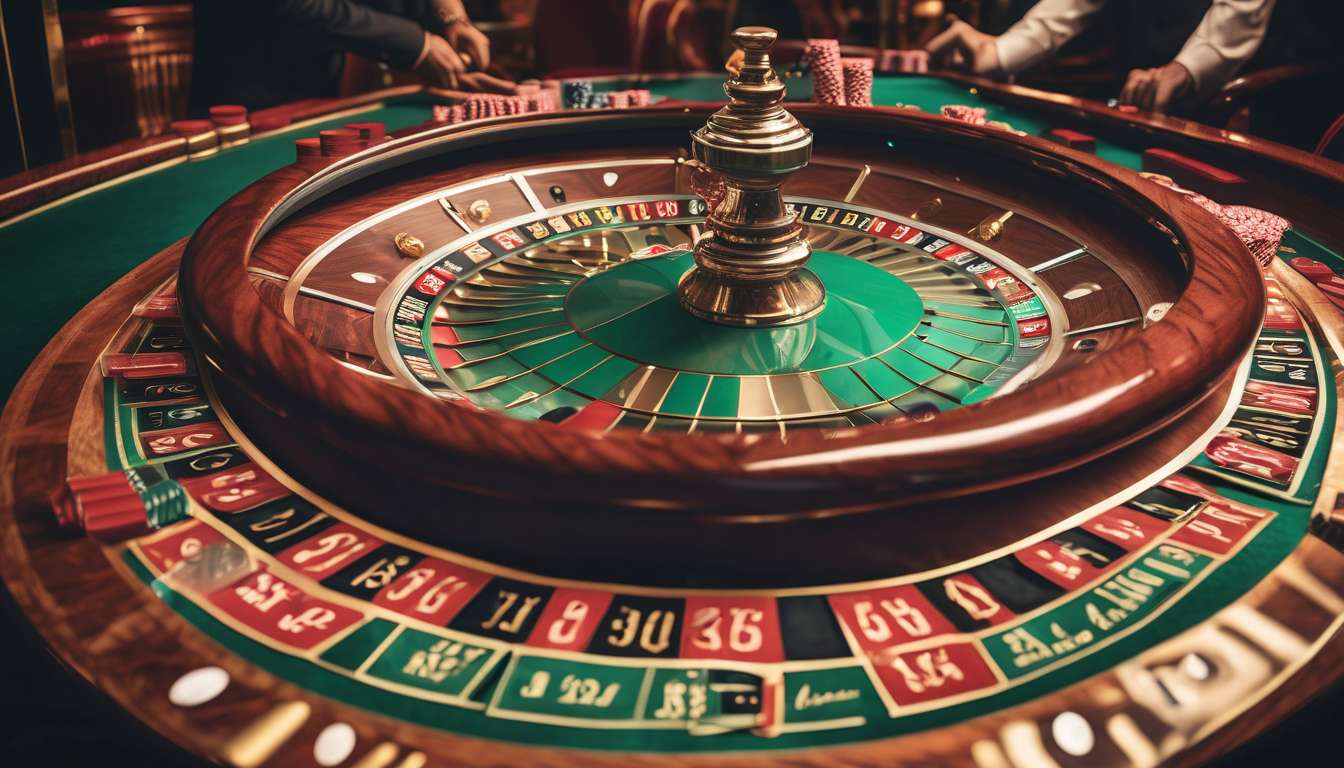As enthusiasts and explorers of the thrilling world of casinos, we often find ourselves mesmerized by the allure of flashing lights and the promise of fortune. Yet, beneath the surface of excitement and chance lies a complex and fascinating realm of mathematics that governs the very games we love.
In this ultimate guide, we embark on a journey to demystify the mathematics behind casino games, bridging the gap between sheer luck and informed strategy. Together, we will delve into the probabilities that dictate:
- The roll of the dice
- The spin of the wheel
- The turn of a card
By understanding the mathematical principles at play, we empower ourselves to make smarter choices and enhance our gaming experiences.
Join us as we unlock the secrets of:
- Odds
- House edges
- Expected values
Transform your approach to casino gaming from casual participation to strategic mastery.
The Fundamentals of Probability
Probability is the foundation of all casino games, helping us understand the likelihood of different outcomes. When we step into a casino, we’re not just gambling with money, but also engaging with mathematics. Probability allows us to estimate how often certain events will occur. Understanding this can make us feel more connected and confident in our gaming experiences.
House Edge is where the casino’s advantage over us comes into play. It is calculated using probability and is an integral part of every game, ensuring the casino remains profitable. By knowing the house edge, we can better manage our expectations and enjoy the games responsibly.
Expected Values are another crucial concept. They represent the average amount we can expect to win or lose per bet over time, based on probabilities.
By grasping these fundamentals, we aren’t just players; we’re informed participants in a thrilling, mathematical dance. Together, we can navigate the casino floor with knowledge and camaraderie.
Dice and Probability Theory
When we roll dice in a casino game, we’re engaging with one of the simplest and most compelling applications of probability theory. The allure of the dice captivates us, with each roll providing an opportunity to test our understanding of probability. The beauty lies in its simplicity—the probability of landing any given number on a standard six-sided die is 1/6.
However, when dice come into play in casino games, we’re also dealing with the house edge, a critical factor ensuring the casino maintains a slight advantage. This edge is what keeps casinos profitable over time, despite the randomness of each individual roll.
As a community of players, we thrive on calculating expected values to predict outcomes and gauge risks. Expected values represent the average result of a game if we could play it an infinite number of times. Understanding these concepts allows us to:
- Evaluate the fairness of a game.
- Anticipate long-term results.
- Make informed decisions about which bets to place.
By grasping these mathematical concepts, we strengthen our sense of belonging within the gaming community. Sharing insights and strategies not only enhances our casino experiences but also fosters a collaborative environment where we can learn from one another.
Let’s continue to explore these probabilities together! Through discussion and analysis, we can deepen our understanding and appreciation of the dynamic interplay between chance and strategy in casino games.
The Mathematics of Roulette
In the world of roulette, we’re captivated by the elegant spin of the wheel and the complex mathematics that govern each outcome. As we gather around the table, we share a fascination with the probability that guides where the ball will land. It’s this chance that makes every spin thrilling.
Together, we explore how each bet carries its own probability, impacting how we play and what we might win. Roulette’s charm lies in its balance between chance and strategy.
The house edge, a slight advantage the casino holds over us, ensures that the odds are never entirely in our favor. Yet, understanding this helps us make informed choices.
By calculating expected values, we can predict our long-term outcomes and navigate the game more wisely. This shared knowledge fosters a sense of camaraderie, as we’re all part of the same quest for that elusive win.
Together, we embrace the mathematics of roulette, enhancing our experience with every spin.
Card Games: A Numbers Game
In card games, we delve into numbers, utilizing strategy and probability to outwit our opponents and the house. By understanding the intricacies of each deck, players enhance their sense of belonging within the gaming community.
Exploring Probability and Strategy:
- We explore the probability of drawing certain cards, allowing us to make informed decisions and anticipate outcomes.
- Analyzing our hand and calculating expected values gives us an edge in the game without relying solely on luck.
Unlocking Card Potential:
- Each card carries potential; it’s our task to unlock it.
- By recognizing patterns and calculating odds, we reduce the house edge, shifting the balance in our favor.
Blackjack as a Strategic Example:
- In blackjack, we use probability to decide when to hit, stand, or double down.
- These decisions maximize our expected values, enhancing our strategic play.
Community and Mastery:
- As we refine our techniques, we become part of the card-playing community.
- We are united by the shared pursuit of strategic mastery and mathematical acumen in the world of card games.
Understanding House Edge
Understanding the house edge lets us grasp how casinos maintain their advantage and enables us to strategize more effectively. When we dive into the world of casino games, the house edge is the statistical advantage that ensures the casino’s profitability over time. While we might come for the thrill, it’s crucial to recognize how probability and expected values play into our gaming experiences.
The house edge varies across different games, with some offering us better odds than others. For example, blackjack typically presents a lower house edge compared to slot machines. Knowing this, we can make informed choices about which games to play, potentially increasing our chances of winning. By understanding the expected values, we align our expectations with the reality of the probabilities involved.
In our shared journey through the casino, recognizing the house edge fosters a sense of community and camaraderie, as we learn to navigate the intricacies of each game together, enhancing our collective experience.
Calculating Expected Values
Expected Value in Casino Games
To determine how much we can expect to win or lose in the long run, we calculate the expected value for each casino game. Expected values help us understand the average outcome based on the probability of each possible result.
Steps to Calculate Expected Value:
-
Identify the Probability of Each Outcome:
- Determine the likelihood of each possible result occurring in the game.
-
Multiply Probabilities by Payoffs:
- For each possible outcome, multiply its probability by the payoff associated with that outcome.
-
Sum the Values:
- Add all the products from the previous step to find the expected value.
This number tells us the average amount we can expect to win or lose per game in the long term.
Understanding the House Edge
The house edge is the casino’s advantage and is closely related to expected values. It’s essential to consider this edge because it represents the expected loss as a percentage of the original bet.
Benefits of Calculating Expected Values:
-
Informed Decision Making:
- By calculating expected values, we’re better equipped to understand the true cost of playing.
-
Game Selection:
- Make informed decisions about which games offer the best balance of fun and potential rewards.
Being part of a group that understands these concepts can enhance our gaming experience, making it more enjoyable and strategic.
Strategies for Better Odds
To improve our chances at the casino, we can employ a variety of strategies that tilt the odds slightly more in our favor.
Focus on Games with a Lower House Edge:
-
By choosing games with a lower house edge, we’re already setting ourselves up for a better chance to walk away winners.
-
Games like blackjack and baccarat often have a smaller house edge compared to others, making them strategic choices for those of us who want to play smart.
Calculate Expected Values:
-
Calculating expected values allows us to predict what we might gain or lose over time.
-
Choosing bets with positive expected values or lower negative values helps us align with our goal of playing strategically while having fun.
Combine Knowledge of Probability, House Edge, and Expected Values:
-
By combining knowledge of probability, house edge, and expected values, we can make more informed decisions.
-
This approach fosters a sense of belonging among us as savvy players.
By understanding these concepts, we can increase our chances of success and enhance our overall casino experience.
Mastering the Math Behind Luck
Understanding the mathematical principles behind luck empowers us to make smarter decisions in casino games. As a community of casino enthusiasts, it’s vital we grasp how probability, house edge, and expected values shape our experiences.
Probability helps us predict the likelihood of certain outcomes. For instance, knowing the probability of landing a specific number in roulette can guide our bets and expectations.
House edge, on the other hand, represents the casino’s advantage over us. It’s crucial we recognize this edge to manage our bankroll effectively. By understanding that the house always has a slight upper hand, we can adjust our strategies to maximize our enjoyment and minimize losses.
Expected values give us a glimpse into the long-term outcomes of our bets. By calculating expected values, we can determine if a bet is likely to be profitable over time.
Together, these mathematical concepts form a toolkit that allows us to engage more deeply with the games we love.
How can understanding casino game mathematics improve my decision-making skills in other areas of life?
Understanding casino game mathematics can enhance our decision-making skills in various aspects of life. By grasping probabilities, risk assessment, and statistical analysis in casino games, we can apply these principles to everyday situations.
This knowledge fosters a more strategic mindset, enabling us to make informed choices with confidence.
Ultimately, mastering these mathematical concepts not only sharpens our decision-making abilities but also empowers us to navigate life’s uncertainties more effectively.
Are there any real-life examples of people who have successfully used mathematics to consistently win at casinos?
Individuals Using Mathematics to Beat Casino Odds
Yes, there are stories of individuals who have successfully applied their mathematical skills to beat the odds at casinos. By employing a combination of probability theory and game strategies, they have managed to consistently win.
Key Elements of Success:
-
Probability Understanding:
- Mastery of probability allows players to calculate odds and make informed decisions.
-
Game Strategies:
- Developing and applying effective game strategies tailored to specific casino games can increase the likelihood of winning.
-
Consistent Winning:
- These individuals have managed not just to win occasionally but to come out ahead consistently over time.
Implications:
- It’s fascinating how they have used their knowledge to turn the tables in their favor.
- This demonstrates that with the right approach and understanding of mathematics, success can be achieved even in games of chance.
These stories highlight the potential of mathematical prowess in environments typically dominated by luck.
How does the psychology of gambling interact with the mathematics behind casino games?
The Intersection of Psychology and Mathematics in Gambling
When we consider how the psychology of gambling intersects with the mathematics behind casino games, it’s fascinating to see how our emotions influence our decision-making at the tables.
Mathematics in Casino Games
Understanding the odds and probabilities can help us make more informed choices. The mathematical aspect involves:
-
Calculating odds and probabilities.
-
Assessing expected values.
-
Evaluating risk versus reward.
Psychological Influences
However, it’s crucial to recognize how our mindset impacts our gameplay. Psychological factors include:
-
Risk-taking tendencies.
-
Chasing losses.
-
Emotional responses to wins and losses.
Complex Dynamics
The combination of math and psychology creates a complex dynamic in the casino environment. This interplay affects not only individual decisions but also the overall atmosphere and strategies within the casino setting.
Conclusion
You’ve now delved into the intricate world of casino game mathematics. By understanding key concepts such as probability, house edge, and expected values, you’ve gained insight into the numbers behind popular games like dice, roulette, and card games.
Armed with this knowledge, you can:
- Make informed decisions
- Strategize for better odds
Remember, mastering the math behind luck can give you an edge in the thrilling world of casino gaming.
Good luck and happy playing!




